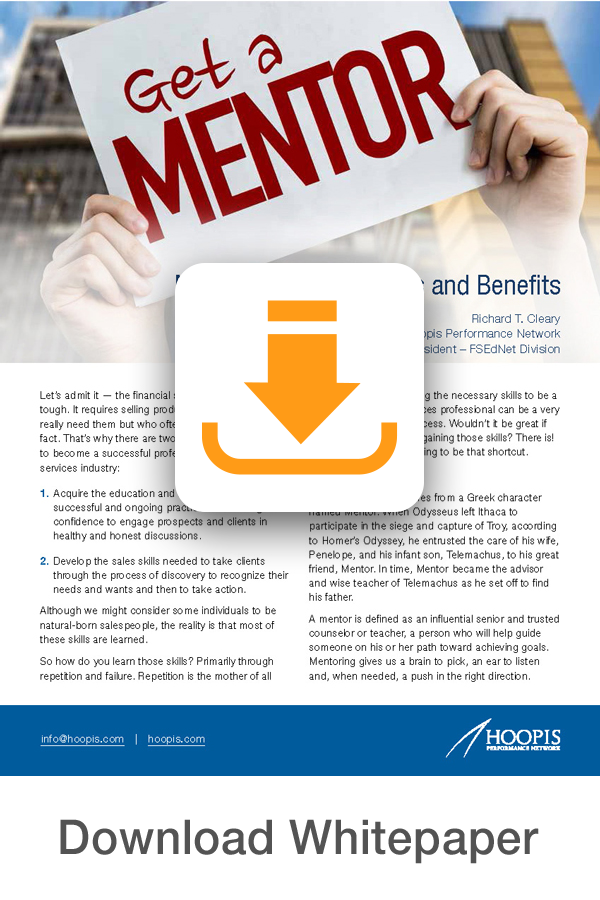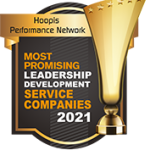Mentoring Opportunities and Benefits

Let’s admit it — the financial services business can be tough. It requires selling products to individuals who really need them but who often are in denial about this fact. That’s why there are two parts to learning how to become a successful professional in the financial services industry:
- Acquire the education and knowledge to build a successful and ongoing practice while having the confidence to engage prospects and clients in healthy and honest discussions.
- Develop the sales skills needed to take clients through the process of discovery to recognize their needs and wants and then to take action.
Although we might consider some individuals to be natural-born salespeople, the reality is that most of these skills are learned.
So how do you learn those skills? Primarily through repetition and failure. Repetition is the mother of all learning; however, learning the necessary skills to be a successful financial services professional can be a very long and challenging process. Wouldn’t it be great if there were a shortcut to gaining those skills? There is! Many have found mentoring to be that shortcut.
What a Mentor Is
The word “mentor” comes from a Greek character named Mentor. When Odysseus left Ithaca to participate in the siege and capture of Troy, according to Homer’s Odyssey, he entrusted the care of his wife, Penelope, and his infant son, Telemachus, to his great friend, Mentor. In time, Mentor became the advisor and wise teacher of Telemachus as he set off to find his father.
A mentor is defined as an influential senior and trusted counselor or teacher, a person who will help guide someone on his or her path toward achieving goals. Mentoring gives us a brain to pick, an ear to listen and, when needed, a push in the right direction.
It’s all about transferring the necessary knowledge, skills and expertise that are essential for any organization or practice. Mentoring can be an effective approach to create, organize, capture and distribute knowledge and demonstrate acquired skills. It supports both short- and long-term growth opportunities for both new associates and veterans.
Mentoring Shortens the Learning Curve
One of the key benefits of mentoring is that it reduces the time required to obtain and successfully execute the required practice-building skills much faster than the old tried-and-failed methods. Mentoring facilitates rapid learning because knowledge transfer is achieved by providing direct access to a range of experts and peers who can share the required skills in an actual working environment.
Because 80 percent of this type of learning (knowledge transfer) is informal, mentoring empowers skill acquisition in ways that most training programs can’t. It shortens the learning curve, enhances productivity and helps everyone align their efforts with a successful business strategy. In addition to streamlining the transfer of marketing and selling knowledge, mentoring can fuel succession planning to ensure that clients will continue to be taken care of and that promises are kept once an advisor retires.
Supplement Mentoring with Other Training
Most mentors will help develop the skill sets necessary for their mentees to become successful. But even the most knowledgeable and skilled mentor doesn’t know everything. Therefore, it is important to supplement the mentoring relationship with additional educational resources and training to ensure that the mentee becomes fully developed in all aspects of his or her role. Early on, a robust and engaging curriculum will need to be provided. In time, pursuing professional designations should be considered.
There are many types of financial services practices, from those that focus on protection products such as life insurance, disability and long-term care to those that use the multiline platform to service consumers and help them protect their property to those that serve primarily the investment marketplace. Mentoring can benefit those in all types of agencies, firms and companies. But mentoring is not about the product you offer; rather, it’s a strategy for improving the level of service, sales ability and skill in understanding clients and their situations.
Mentoring Tips Based on Best Practices
Here are some mentoring best practices:
- Mentees: Choose your mentor carefully. If having a mentor seems like a good strategic move, then pick someone with a practice you aspire to have. The mentor should be someone you can trust and feel comfortable sharing your beliefs and shortcomings with.
- Mentors: Be prepared before agreeing to mentor someone. Understand the level of commitment and what would be expected of you. Make sure you have the time, energy, and patience to start a mentoring relationship.
- Try it out on a trial basis. Many mentorships can be long term, but you could always try the arrangement out on a trial basis. This way, if either the mentor or mentee is uncomfortable or does not see the pairing as a good fit, bad feelings are less likely to exist if the relationship doesn’t continue.
- Specify both parties’ objectives. In any relationship, an up-front mutual understanding of what will be expected of both parties is very important. Don’t just verbalize these mutual agreements; put them in writing, and have a third party review them for additional input. And be specific. Clarity is essential before starting a mentorship. Clarify specific areas the mentorship will cover, including these details:
• What both the mentee and mentor want out of the relationship
• A general structure for the meetings and conversations
• How the mentor and mentee will handle takeaway tasks/next steps/ action items
• How often the parties will communicate; the ideal times and days for these communications; and how and where this communication will be accomplished, such as in person, by phone or via video conferencing
• A confidentiality agreement
• Agreement about how to handle any splits in compensation and production credit
• How and when this mutual agreement can be modified or even be canceled - Listen and learn. In successful mentorships, both parties will enjoy the benefit of learning, and they will listen to one another. Mentors must be willing to let the mentees speak freely and state whatever is on their minds, whether it is a question or a concern. There must be an open two-way dialogue. Mentors who only talk at their mentees will offer very little value.
- Be willing to share. The bottom line in a mentoring relationship is about sharing. If either party is not willing to share, then the true benefits of mentoring will be lost. By sharing their career experiences — both the good and the bad, as well as their techniques — mentors will help their mentees gain critical experience and avoid some of the pitfalls that many face. Mentees must be just as open and honest in return.
- Consider a mentoring relationship with someone outside your company or firm. Not all mentor– mentee relationships are formed with individuals who work for the same agency, firm or company. Sometimes it’s beneficial to see the perspective of someone who works in a different organization. But working with someone inside the same organization can offer additional benefits such as job security and the potential to become a partner or a successor one day.
- Work to derive mutual benefit. The relationship must offer both parties benefits. Ideally, the two will learn to work smarter and not necessarily harder. As the relationship progresses, it must become more efficient and more flexible. Mentees must understand that they have the primary responsibility for their career success — it is not the mentor’s responsibility. However, the more engaging a mentor is or can become, the easier the transfer of knowledge will be for both.
- Mentors and mentees: Be open to new ideas. Mentees can gain so much more than just knowledge and habits. A good mentor can have a huge impact on a mentee’s life path. But openness is not just something the mentor needs to have. Reverse mentoring is the process through which the mentee teaches the “old dog” new tricks. For example, a newer advisor could teach a veteran advisor how to navigate social media or how to use and benefit from new software programs and apps. Mentors who are open to listening and evolving their practices can learn valuable strategies from their younger colleagues.
If you have not been engaged in using the mentoring concept, maybe the time has come to do so. We all seek increased productivity and the ability to break into new markets more efficiently and in less time. Mentoring may be the answer.
Use Hoopis Performance network Videos in Your Advisor Training
Consider using our virtual training videos in your company, agency or firm on mentoring relationship series for both financial professionals and the leadership teams. HPN brings you winning training for sales associates, and sales leaders. They can access training and information on their smartphones and tablets when they have spare time, learn at their own pace and customize their curriculum based on what interests them the most.



